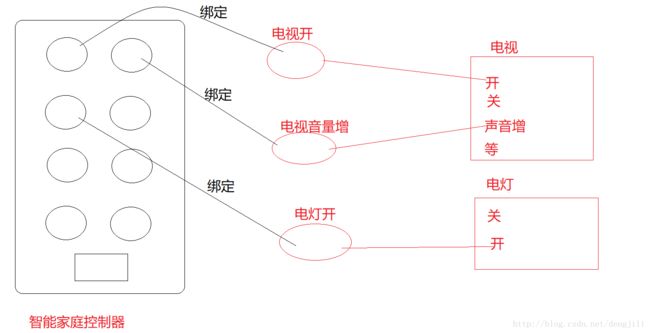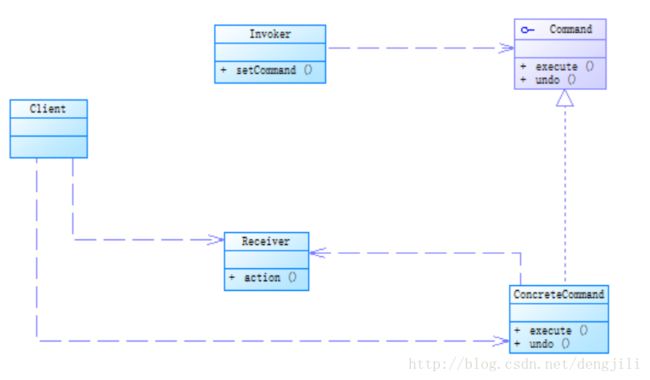命令模式-headfirst例子改进
分析命令模式
引入情景分析
现在我们有很多智能家居,他们都由同一个控制器控制,比如,能控制点灯,窗帘,电视等

每一个按钮(相当于命令)都对应一个电器的功能,列如点灯的开,电视的关等,如下

但是控制器1按钮,对应功能不一定是电视开功能,也可能是电灯开功能,或者其他,也就是说,我们的控制器按钮,可以绑定任意的具体电器功能,(这也是我们在设计模式中所追求的),所有我们修改一下设计,定义统一接口,以便控制器能够自由更换绑定功能

开启第一个例子
我们为智能家庭控制器的第一个控制,给电视的开功能
原始电视功能
package headfirst.hd.command;
//原始电视类
public class TV {
public void open() {
System.out.println("打开电视");
}
public void off() {
System.out.println("关闭电视");
}
public void increaseVolume() {
System.out.println("减小音量");
}
public void reduceVolume() {
System.out.println("增大音量");
}
}
定义统一接口
package headfirst.hd.command;
public interface Command {
void execute();
}
封装电视开功能
package headfirst.hd.command;
//通过适配器方式,适配出一个开功能
public class TvOpen implements Command {
TV tv;
public TvOpen(TV tv) {
this.tv = tv;
}
@Override
public void execute() {
tv.open();
}
}适配模式参考:http://blog.csdn.net/dengjili/article/details/79485034
智能家庭控制器,这里简单化,只实现一个按钮的功能
package headfirst.hd.command;
//智能家庭控制器
public class HomeRemoteControl {
//一个按钮,多个按钮可定义为数组
Command command;
// 将按钮与功能绑定
public void setCommand(Command command) {
this.command = command;
}
// 按功能键
public void pressButton() {
command.execute();
}
}
测试类
package headfirst.hd.command;
public class DriveTest {
public static void main(String[] args) {
//智能家庭控制器
HomeRemoteControl control = new HomeRemoteControl();
TV tv = new TV();
//通过适配器方式,适配出一个电视开功能
TvOpen tvOpen = new TvOpen(tv);
//绑定电视开功能
control.setCommand(tvOpen);
//按键
control.pressButton();
}
}
开启第二个例子
将第一个功能更换为电视关功能
适配电视关功能
package headfirst.hd.command;
//通过适配器方式,适配出一个开功能
public class TvOff implements Command {
TV tv;
public TvOff(TV tv) {
this.tv = tv;
}
@Override
public void execute() {
tv.off();
}
}
重写绑定新功能
package headfirst.hd.command;
public class DriveTest {
public static void main(String[] args) {
//智能家庭控制器
HomeRemoteControl control = new HomeRemoteControl();
TV tv = new TV();
//通过适配器方式,适配出一个电视开功能
TvOpen tvOpen = new TvOpen(tv);
//绑定电视开功能
control.setCommand(tvOpen);
//按键
control.pressButton();
//通过适配器方式,适配出一个电视开功能
TvOff tvOff = new TvOff(tv);
//绑定电视开功能
control.setCommand(tvOff);
//按键
control.pressButton();
}
}对应的设计图
上述代码的改进
当没有绑定具体的功能时候,调用代码,报空指针异常
package headfirst.hd.command;
public class DriveTest {
public static void main(String[] args) {
//智能家庭控制器
HomeRemoteControl control = new HomeRemoteControl();
//按键
control.pressButton();
}
}通常逻辑,判空。但不是最好的方式
package headfirst.hd.command;
//智能家庭控制器
public class HomeRemoteControl {
//一个按钮,多个按钮可定义为数组
Command command;
// 将按钮与功能绑定
public void setCommand(Command command) {
this.command = command;
}
// 按功能键
public void pressButton() {
if (command != null) {
command.execute();
}
}
}
更优秀的方式,NoCommand对象
NoCommand
package headfirst.hd.command;
//NoCommand对象,什么都不做,通常用于初始化
public class NoCommand implements Command {
@Override
public void execute() {
}
}
package headfirst.hd.command;
//智能家庭控制器
public class HomeRemoteControl {
//一个按钮,多个按钮可定义为数组
Command command = new NoCommand();
// 将按钮与功能绑定
public void setCommand(Command command) {
this.command = command;
}
// 按功能键
public void pressButton() {
//不用判空
command.execute();
}
}
NoCommand对象是一个空对象(null object)的例子。当你不想返回一个有意义的对象时,空对象就很有用。客户也可以将处理null的责任转移给空对象。举例来说,遥控器不可能出厂就设计了有意义的命令对象,所以提高了NoCommand对象作为代替品,当调用它的execute()方法时,这种对象什么事情都不做。
定义命令模式
对应的设计图
1) 命令角色(Command):声明执行操作的接口。有java接口或者抽象类来实现。
2) 具体命令角色(Concrete Command):将一个接收者对象绑定于一个动作;调用接收者相应的操作,以实现命令角色声明的执行操作的接口。
3) 客户角色(Client):创建一个具体命令对象(并可以设定它的接收者)。
4) 请求者角色(Invoker):调用命令对象执行这个请求。
5) 接收者角色(Receiver):知道如何实施与执行一个请求相关的操作。任何类都可能作为一个接收者。
继续完成上面的例子,加上命令模式思想
重要代码
洗衣机
package headfirst.hd.command;
public class Washing {
public void putWater() {
System.out.println("洗衣机加水");
}
public void turn() {
System.out.println("洗衣机转动,开始洗衣服");
}
public void dry() {
System.out.println("洗衣机甩干");
}
public void stop() {
System.out.println("停止");
}
}
洗衣机开功能
package headfirst.hd.command;
//通过适配器方式,适配出一个开功能
public class WashingOn implements Command {
Washing washing;
public WashingOn(Washing washing) {
this.washing = washing;
}
@Override //智能洗衣机
public void execute() {
washing.putWater();
washing.turn();
washing.dry();
washing.stop();
}
}
洗衣机关功能
package headfirst.hd.command;
//通过适配器方式,适配出一个关功能
public class WashingOff implements Command {
Washing washing;
public WashingOff(Washing washing) {
this.washing = washing;
}
@Override
public void execute() {
washing.stop();
}
}
智能家庭控制器,这里实现八个按钮的功能
package headfirst.hd.command;
//智能家庭控制器
public class HomeRemoteControl {
//8个按钮
Command[] commands;
public HomeRemoteControl() {
commands = new Command[8];
Command noCommand = new NoCommand();
for (int i = 0; i < commands.length; i++) {
commands[i] = noCommand;
}
}
// 将按钮与功能绑定
public void setCommand(int index, Command command) {
this.commands[index] = command;
}
// 按功能键
public void pressButton(int index) {
this.commands[index].execute();
}
@Override
public String toString() {
StringBuffer sb = new StringBuffer();
sb.append("\n-------------远程控制-----------\n");
for (int i = 0; i < commands.length; i++) {
Command command = commands[i];
sb.append("命令["+i+"],").append(command.getClass().getName()).append("\n");
}
return sb.toString();
}
}
测试类
package headfirst.hd.command;
public class DriveTest {
public static void main(String[] args) {
//智能家庭控制器
HomeRemoteControl control = new HomeRemoteControl();
System.out.println(control);
//电器
Light light = new Light();
TV tv = new TV();
Washing washing = new Washing();
//功能适配
LightOn lightOn = new LightOn(light);
LightOff lightOff = new LightOff(light);
TvOpen tvOpen = new TvOpen(tv);
TvOff tvOff = new TvOff(tv);
TvIncrease tvIncrease = new TvIncrease(tv);
TvReduce tvReduce = new TvReduce(tv);
WashingOn washingOn = new WashingOn(washing);
WashingOff washingOff = new WashingOff(washing);
//绑定
control.setCommand(0, lightOn);
control.setCommand(1, lightOff);
control.setCommand(2, tvOpen);
control.setCommand(3, tvOff);
control.setCommand(4, tvIncrease);
control.setCommand(5, tvReduce);
control.setCommand(6, washingOn);
control.setCommand(7, washingOff);
System.out.println(control);
//开个电视
control.pressButton(2);
//洗个衣服
control.pressButton(6);
}
}
测试结果
-------------远程控制-----------
命令[0],headfirst.hd.command.NoCommand
命令[1],headfirst.hd.command.NoCommand
命令[2],headfirst.hd.command.NoCommand
命令[3],headfirst.hd.command.NoCommand
命令[4],headfirst.hd.command.NoCommand
命令[5],headfirst.hd.command.NoCommand
命令[6],headfirst.hd.command.NoCommand
命令[7],headfirst.hd.command.NoCommand
-------------远程控制-----------
命令[0],headfirst.hd.command.LightOn
命令[1],headfirst.hd.command.LightOff
命令[2],headfirst.hd.command.TvOpen
命令[3],headfirst.hd.command.TvOff
命令[4],headfirst.hd.command.TvIncrease
命令[5],headfirst.hd.command.TvReduce
命令[6],headfirst.hd.command.WashingOn
命令[7],headfirst.hd.command.WashingOff
打开电视
洗衣机加水
洗衣机转动,开始洗衣服
洗衣机甩干
停止
组合命令使用
将多个功能绑定在一个按钮上,比如当我们按下一个按钮时候,我们需要将电视打开,增加音量,然后将点灯关闭
组合命令CompositeComand
package headfirst.hd.command;
//组合命令
public class CompositeComand implements Command {
Command[] commands;
public CompositeComand(Command[] commands) {
this.commands = commands;
}
@Override
public void execute() {
for (Command command : commands) {
command.execute();
}
}
}
测试类
package headfirst.hd.command;
public class DriveTest {
public static void main(String[] args) {
//智能家庭控制器
HomeRemoteControl control = new HomeRemoteControl();
//电器
Light light = new Light();
TV tv = new TV();
//功能适配
TvOpen tvOpen = new TvOpen(tv);
TvIncrease tvIncrease = new TvIncrease(tv);
LightOff lightOff = new LightOff(light);
//多功能绑定
Command[] commands = new Command[]{tvOpen, tvIncrease, lightOff};
CompositeComand compositeComand = new CompositeComand(commands);
//绑定
control.setCommand(0, compositeComand);
System.out.println(control);
//一键将电视打开,增加音量,然后将点灯关闭
control.pressButton(0);
}
}
测试结果
-------------远程控制-----------
命令[0],headfirst.hd.command.CompositeComand
命令[1],headfirst.hd.command.NoCommand
命令[2],headfirst.hd.command.NoCommand
命令[3],headfirst.hd.command.NoCommand
命令[4],headfirst.hd.command.NoCommand
命令[5],headfirst.hd.command.NoCommand
命令[6],headfirst.hd.command.NoCommand
命令[7],headfirst.hd.command.NoCommand
打开电视
减小音量
关闭点灯
命令模式undo,redo讲解:http://blog.csdn.net/dengjili/article/details/79533521
应用,队列请求列子:
http://blog.csdn.net/dengjili/article/details/79546480


